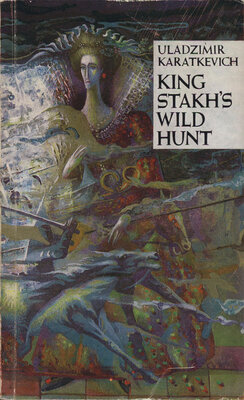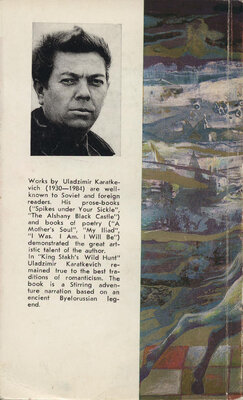King Stakh's Wild Hunt
Уладзімір Караткевіч
Выдавец: Мастацкая літаратура
Памер: 248с.
Мінск 1989
And then the Polish landowner, Roman, took his lunge, holding it by the handle with both hands, come up to King Stakh from behind, threw the lunge over his head, and lowered the lunge with its sharp end onto the back of King Stakh’s head. The drowsy King lifted his head, looked into Roman’s eyes, and his face running with blood was like a terrible wail to God for vengeance.
‘‘But what have you done? We are brothers, aren’t we?” And attempting to rise, he shouted:
“Why have you sold your people, apostate? You have deprived many people of their happiness now.”
Roman struck him with his sword a second time, and Stakh fell, but he had not yet lost the gift of speech:
“Now beware, you traitor! My curse on you and your evil kin! May the bread in your mouth turn to stone, may your wives remain childless, and your husbands choke in their own blood!”
And then, his voice weakening, he said cruelly:
“You’ve betrayed your land, my former brother! But we shall not die. We’ll yet come to you and to your children, and to their heirs, my hunters and 1. Unto the twelfth generation will we take revenge ruthlessly, nor shall you hide from us. You hear? Unto the twelfth generation! And each generation shall tremble with greater pain and more terribly than I now at your feet.”
And he dropped his head. And his hunters dumb until now, at last came to, and snatched up their knives. And they fought twenty against three, and the battle was a fearful one. But the three conquered the twenty and killed them.
And afterwards they strapped the corpses and the wounded, who were pitifully groaning, to their saddles and drove off the horses, and the horses hastened off in a straight line to the Giant’s Gap.
But nobody had noticed that there was a spark of life yet in King Stakh’s body. The horses flew on into the night, and a faint moon lit up their long manes, and somewhere ahead of them blue lights skipped about among the mounds.
And from this wild herd came King Stakh’s voice:
“To the devil with my soul, if God doesn’t help. Hold Roman! Our horsemen are coming at a gallop to you! Tremble, Roman, and shiver, our eternal enemy. We shall come! We shall avenge!”
And nobody knew that these words were true words, that King Stakh had become a weapon in the hands of the devil for revenge and punishment. No murder whatever deserves such vengeance as fratricide.
Not long was their stay on this earth. The beater-in, Varona, was the first to see the ghosts of Stakh and his followers within two weeks. The Wild Hunt raced on heedlessly, onward it flew across the most terrible quagmire, across the forest, across the rivers.
No tinkling of bits, no ringing of swords. Silent were the horsemen on their horses, and ahead of the phantom King Stakh’s Wild Hunt were the swamp lights skipping across the quagmire.
Varona went mad. And Dubatowk perished afterwards. The Lithuanian hetman dispersed peasant armies who were left without a lead
er; Yarash Shtamet was killed in battle. But Roman Yanowsky was alive and laughed.
But once after hunting, he was returning home alone through the heather wasteland, the moon hardly lighting the way for him. Suddenly from somewhere behind him the marsh lights came skipping. And the sound of bugles reached him, and the stamping of hoofs which was heard but faintly. Later, vague apparitions of horsemen were seen. The horses’ manes waved with the wind, an unleashed cheetah ran ahead of the phantom Wild Hunt. And noiseless was their flight across the heather and the quagmire. And silent were the horsemen, while the hunting sounds came flying from somewhere on the other side. And ahead of all, dimly lit by the moon, galloped the enormous King Stakh. And brightly burned the eyes of the horses, the people and the cheetah.
And Roman raced on, and they silently and quickly flew after him; the horses sometimes pawed the ground in their flight, and the wild heather sang, and the moon looked at the chase with indifference.
And Roman did thrice shout: “The Wild Hunt!” So loud his voice that he was heard by people even in distant huts. And then the Wild Hunt caught up with him, and his heart failed him. That is how Roman perished.
From that time on many people saw King Stakh’s Wild Hunt in the peat-bogs. And although this Wild Hunt penalized not everybody, there were few people whose hearts did not fail them when they saw the dark shadows of the horsemen in the swamps.
In this way did Roman’s son and the son of his son perish, after whose death I am writing about this for the sake of science and to frighten
his descendants who, perhaps, by doing good deeds could deprive the ancient curse of its power over them.
People, beware of the quagmire, beware of the swamps at night, when the blue lights gather and begin dancing in the worst places. There you will see 20 horsemen, their chief racing ahead of all of them, the brim of his hat pulled down over his eyes. No clanging of swords, no neighing of horses.
From somewhere, and only rarely, can be heard the song of a huntsman’s bugle. Manes are flying, marsh lights are twinkling under the horses’ hoofs.
Across the heather, across the fatal quagmire rides the Wild Hunt, it will ride as long as the world lasts. It is our land, a land we do not love, a terrible land. May God forgive us!...
I tore myself away from the papers and shook my head, desiring to rid myself of the wild images. Berman looked at me biding his time.
“Well, I beg your pardon, but what does the gentleman think of this?”
“What an awful, a beautiful and fantastic legend!” I exclaimed. “It just begs for the brush of a great artist. There is nothing one’s imagination cannot invent!”
“Oh! If this were, I beg your pardon, but a legend... You must know I am a free-thinker, an atheist, as is every person who lives in the spirit of our highly-educated age. But I believe in King Stakh’s Wild Hunt. And, indeed, it would be strange not to believe in it. It is due to the Wild Hunt that Roman’s descendants have perished and the Yanowsky family has almost become extinct.”
“Listen,” I said, “I have already said this to
one person, and now I shall say it to you. I can be carried away by an old legend, but what can make me believe it? Roman’s descendants were killed by The Hunt 200 years ago. In those days the Mogilyov Chronicle seriously claimed that before the war there appeared on the Mogilyov stone walls (which a man cannot climb) bloody imprints left by the palms of hands.”
“Yes, I remember that,” the book-lover answered. “And a number of other examples might be given, but they ...m-m... are somewhat frivolous. Our ancestors were such crude people.”
“So you see,” I said reproachfully. “And you believe in this Hunt.”
The doll-like man, it seemed to me, hesitated somewhat.
“Well, and what would you say, Honourable Sir, were I to declare that I had seen it?”
“A fable,” I cut him off harshly, “and aren’t you ashamed of yourself to frighten a woman with such reports?”
“They are not fables,” Berman turned pink, “this is serious. Not everyone can be a hero, and I, honestly speaking, am afraid. Now I do not even eat at the same table with the mistress, because King Stakh’s anger falls also on such as she. You remember, don’t you? In the manuscripts?...”
“And how did you see the Wild Hunt?”
“As it is described here in the book. I was at Dubatowk’s, a neighbour of the Yanowskys. By the way, a descendant of that Dubatowk, and was returning home from his house. I was walking along the heather wasteland just past the enormous pile of boulders. And the night was rather bright. I didn’t hear them appear! They rushed past me directly across the quagmire. Oh! It was frightening!”
A turbid look of confusion flashed in his eyes. And I thought that in this house, and probably, in the entire plain there was something wrong with the brains of the people.
“Isn’t there at least one normal person here? Or all of them are mad?” I thought.
“Most important was that they tore along noiselessly. The horses, you must know, of such an ancient breed, they are nowhere to be found today for love or money — they are extinct now: genuine Polessye “dryckgants” with their tendons cut at the tails. The manes waved with the wind, their veleis capes were clasped at the right shoulder so that they did not interfere with the hand holding the sword.”
“Those capes were worn only over a coat of mail,” I told him disrespectfully. “But what coat of mail could there be when on the hunt?”
“That I know,” simply and very frankly did this doll-like man agree with me, fixing his big fawning eyes on me, eyes as tender as a deer’s. “Believe me, if I had wished to lie, I could have invented something much better.”
“Then I beg your pardon.”
“These capes are blown about by the wind behind the riders’ backs. Their lances extend upwards in the air, and they race, race like an invasion.”
“Again I must beg your pardon. But tell me, perhaps at supper at your neighbour’s you had been treated to some mead?”
“I don’t drink,” Berman-Gatzevich compressed his lips with dignity. “And I can tell you, they didn’t even leave any imprints, and the horses’ hoofs were hidden by the fog. And the face of the King was calm, lifelessly dull, dry and quite grey, like fog. What is most important is that they arrived at the Yanowskys’
castle that night. When I returned home I was told that at midnight the ring on the door thundered and a voice cried: “Roman of the twelfth generation, come out!”
“Why Roman?”
“Because Nadzeya, the last of Roman’s descendants, is exactly the twelfth generation.”
“I do not believe it.” I said again, resisting to the very end, because Berman’s face was really pale. “Give me the Yanowsky family register.”
Berman readily dragged out and unrolled the parchment manuscript with the family tree. And indeed, eleven generations appeared in the list. From the time of Roman the Elder. Below the eleventh generation, again Roman, an entry was made in a small handwriting: “October 26th, 1870 my daughter, Nadzeya, was born. The last, our twelfth generation, my only child. Cruel fate, remove your curse from us, let only the eleventh generation perish. Have pity on this tiny bundle. Take me, if that is necessary, but let her live. She is the last of the Yanowskys, I set my hopes on you.”
 КНІГІ ОНЛАЙН
КНІГІ ОНЛАЙН


